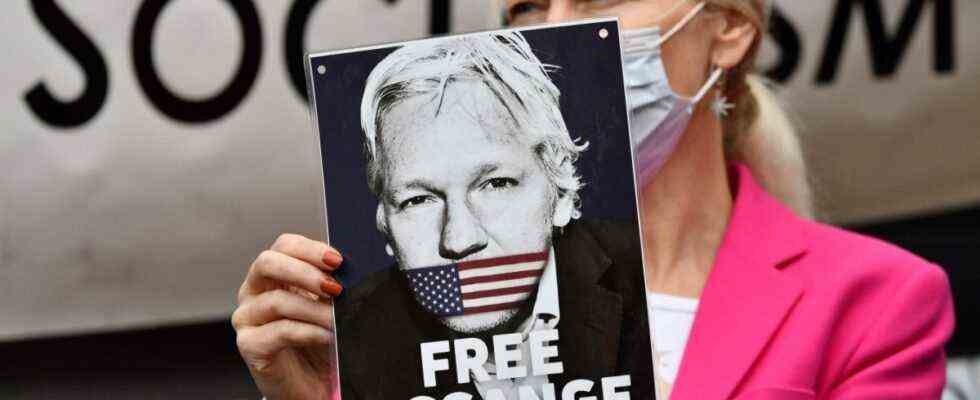They have set up a microphone in front of the court, they call it “the microphone of the people”. A woman in a red coat and woolen hat picks it up on Thursday morning and says, “Hi, I’m Rachel from Birmingham.” She came here to London to demonstrate for the release of her hero. Then she calls: “Free Julian Assange!” It only takes a second and the people around you join in: “Free Julian Assange!”
There are a good 70 demonstrators who have gathered in front of the fence of the Royal Courts of Justice. Many people know each other, they have already spent a few days outside in court to fight for him in recent years: Julian Assange, founder of the platform Wikileaks. The US is still demanding his extradition – and an appeal began this week in the London High Court after a district court ruled in January that Assange could not be transferred to the US due to his health and the expected prison conditions.
It is the latest twist in the struggle of the most powerful state in the world against arguably the most powerful exposure activist in the world. The United States of America versus Julian Assange. If the US wins this fight and the Wikileaks founder is actually extradited, he faces 18 charges and up to 175 years in prison.
The 50-year-old should be tried on the basis of the “Espionage Act”. The law, which is more than a hundred years old, was originally intended to prevent military secrets from being revealed to opponents of the war. In the past few years it was mainly used against whistleblowers. The US accuses Assange of stealing and publishing secret material from US military operations in Iraq and Afghanistan.
“Depressing risk of suicide”
In the London High Court on Wednesday and Thursday, however, it was less about what Assange is accused of than about his state of health and the imminent conditions of detention in America. Attorney James Lewis, who represented the United States in the courtroom, questioned the medical opinion that was the basis for the district court’s decision that Assange could not be extradited.
The judge had declared in January that there was an “oppressive risk of suicide”. US attorney Lewis, however, is of the opinion that the judge was deceived by the expert who prepared the opinion. The latter did not mention that Assange had fathered two children during his refuge in the Ecuadorian embassy in London, which could possibly reduce the risk of suicide.
Assange’s lawyers, in turn, stated that the expert did not raise this issue in order to protect the family of the Wikileaks founder. In addition, the US promise not to use “special methods” in a maximum security prison in the event of extradition is “vague” and “meaningless”.
This also applies to the US offer that Assange could serve a possible prison sentence in his native Australia. Assange’s attorney Edward Fitzgerald pointed out that if extradited, one thing in particular would be lost: the support of his family, who visit him regularly in London’s maximum security prison, Belmarsh. Should Assange be transferred to the United States, he would experience an even more extreme form of isolation – this is another danger to his health.
The CIA is said to have thought about an attack on Assange
Fitzgerald also brought in the youngest this week Investigative journalists’ exposures in court. Citing unnamed US sources, they reported that the CIA had forged plans to attack Assange while he was still at the Ecuadorian embassy. “There was talk of killing, kidnapping or poisoning Mr. Assange,” Fitzgerald said Thursday. There are therefore many fears of what might happen to him in the event of extradition to the USA.
Assange himself was not in the courtroom on the two days of the trial. He was only connected by video on Wednesday. On Thursday, his lawyer stated that his client did not feel able to follow up on what happened. Stella Moris, Assange’s fiancée, who was watching the appeal in court, described his health as “very poor” and “worrying”.
The Lord Chief Justice said at the end of the two-day hearing that there is now “a lot to consider” – and that it will take “some time” to reach a decision.

